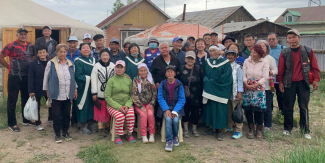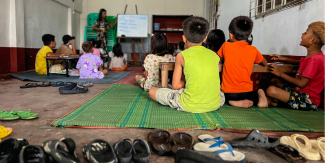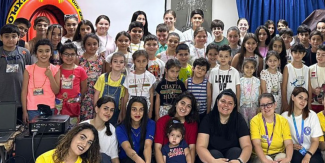August 8, 2019 · ERIC PAUL
Reprinted with permission from The Foundry Community. Read the original post, published May 10, 2018, here.
“I tell you, my friends, do not be afraid of those who kill the body and after that can do no more” (Luke 12:4).
“What disarms the aggressor is not our better ability to use and implement violence, but to be freed from the grip that fear has over us” (Stephen D. Long).

The past few months have been marked by both horrendous tragedy and uncivil discourse. In the wake of the Stoneman Douglas shooting that claimed seventeen lives, our national discussion around gun legislation has reached a fever pitch. And, thanks to the amplified voices of the teenage survivors of another school massacre, it seems that this time might be different than months and years past. These young prophets just might not let the conversation die off in the wake of the next big national story.
For Christians, we take time to discern what God longs to do in such brokenness. If the gospel is good news, then it must be good news for real-world challenges. We understand that our life together, as the body of Christ in this world, acts as a witness of love to the politics of the state. But in many cases, our witness of love becomes muddled by stories that are not true, and we may find ourselves driven more by fear and the pursuit of security than by faithfully living the promise of resurrection. In the past few weeks, one such statement I’ve heard says, “It’s not a gun problem; it’s a heart problem.”
This simple dismissal is problematic for several reasons, but I want to rest on just one: it cultivates an us-versus-them binary that enables a politic of fear. If we can learn to identify our fears and rest securely in God’s salvation, we can break free from narratives that require us to pick the best of two bad options (such as right vs. left). Faith is both a gift of the Holy Spirit and a learned posture.
When Christians claim that gun violence is a heart problem, they are implying that the only heart that needs saving is that of the perpetrator. The “heart problem” only belongs to those whose actions are violent. But this is one of those classic moments where we don’t say, “No, but” but, rather, “Yes, and.” Yes, the perpetrator’s heart may be callous and filled with hate, anger, or racism, and the same violence that runs through him (because perpetrators of mass gun violence are overwhelmingly male) also runs through each of us. This is the story of sin let loose in the world. But rarely do we stop to reflect on our own motivations, biases, and addictions to fear and anger. When we say it’s a heart problem, and stop right there, we may subconsciously be seeking to distance ourselves from “those violent ones.” Once we’ve created these others, and confined them in a labeled group, we only see the differences between us rather than the sameness we share. We no longer see the image of God in them. We only see an enemy. Fear plays an intricate role in maintaining these boundaries.
Fear can stifle our ability to imagine and enact the kingdom of God.”
Fear can stifle our ability to imagine and enact the kingdom of God. After Columbine, Virginia Tech, Sandy Hook, and Stoneman Douglas, we understand a little more of what Howard Thurman describes as the “hounds of hell.” For Thurman, Jesus proclaimed the good news that “fear, hypocrisy, and hatred—the three hounds of hell that track the disinherited—need have no dominion over them.” In the wake of these mass shootings, a new set of fears have made their way into our national consciousness. Are my children safe? If schools are no longer safe, what other places are vulnerable? When will it happen again? Will it happen to me and my family? An anxiety surfaces where one imagines the state of being a potential victim.
Thurman, writing from the position of the oppressed in the segregated South of the United States, characterized fear this way: “It has its roots deep in the heart of the relations between the weak and the strong, between the controllers of environment and those who are controlled by it. When the basis of such fear is analyzed, it is clear that it arises out of the sense of isolation and helplessness in the face of the varied dimensions of violence to which the underprivileged are exposed. . . . It is spawned by the perpetual threat of violence everywhere. . . . It is what is feared by the rabbit that cannot ultimately escape the hounds.”
When we fear, we cannot love.”
Fear perpetuates violence. Fear paralyzes us and puts us on the defensive. When we fear, we cannot love. Jesus’s presence with the poor and oppressed modeled the power of love, solidarity, and forgiveness. Through Christ, we begin to better understand that perfect love casts out fear, providing a path off the binary track of us versus them. On a deeper level, the violence of mass shootings causes a pattern to emerge where self-protection becomes the mechanism by which life seems possible. Fear becomes the driving structure that orders our consciousness and forms our actions. So we pick the story of safety and security as preeminent. The challenge, of course, is that the gospel doesn’t spend much time encouraging us to seek safety and security.
The Gospels do, however, spend a lot of time talking about fear. One story in particular is worth telling. Jesus has recently been arrested, tortured, and put to death. His disciples, fearing for their lives (sound familiar?), ran away and hid. A few days after Jesus was crucified, they are huddled together, scared for their own lives, fearful of an unknown future, and afraid of the new normal. The risen Christ appears before them, and the first words he speaks are “Do not be afraid.” We know the disciples will continue to be hunted, often enduring physical harm and eventual martyrdom. Yet Jesus still tells them to not be afraid.
The power of the resurrection is the antidote to fear. It is the event that transforms human relationships and the histories that shape us. Faith in a resurrected Christ rearranges our strategies and changes our coping mechanisms. Rather than pining after the kind of security that a gun offers, perhaps we Christians can learn to depend on the kind of salvation that Jesus offers. But even further, we understand that the promise of resurrection is for all of us. Scripture reminds us that we need not fear those who can kill the body because, in cross and resurrection, God is already making all things new (Luke 12)
The resurrection is the ultimate assurance that violence will not strip you of your humanity.”
There will be justice for both victim and oppressor. And this is also where Howard Thurman lands. The resurrection is God’s ultimate answer to those who put their sword away, pick up their cross, and follow Jesus. The resurrection is the ultimate assurance that violence will not strip you of your humanity. God “cares for me! To be assured of this becomes the answer to the treat of violence—yea, to violence itself. To the degree that a [person] knows this, he is unconquerable from within and without.” Resurrection sends the disciples into the world in joyous song to wage peace through the habits of love so that you end up with a tradition that St. Clement of Alexandria describes as “an army without weapons, without war, without bloodshed, without anger, without defilement.”
Your kingdom come.
ERIC PAUL
Eric Paul serves as a missionary pastor in Hawaii (the Big Island) alongside his wife, Joy. After grieving the lost dream of becoming a full-time ski bum, he settled for surfing and foraging for avocados and mangos. Eric uses his gifts in teaching, writing, and community development to wed the work of the church to the health of the community. Eric studied nonviolent movements of social change at Vanderbilt Divinity School and remains hopeful that the church can be an agent of God's shalom in the world.
The past few months have been marked by both horrendous tragedy and uncivil discourse. In the wake of the Stoneman Douglas shooting that claimed seventeen lives, our national discussion around gun legislation has reached a fever pitch. And, thanks to the amplified voices of the teenage survivors of another school massacre, it seems that this time might be different than months and years past. These young prophets just might not let the conversation die off in the wake of the next big national story.






Add new comment